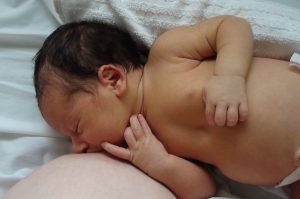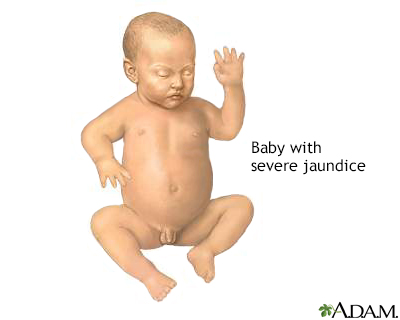Increased red blood cell breakdown. On the fifth day the baby gets about 45 ml 1 ½ ounces per feeding.

Breast Milk Jaundice Vs Lactation Failure Jaundice Breastfeeding Jaundice Youtube
The jaundice will fade over the next couple of weeks but Ive seen yellow tinged eyes for up to 2 months.

Breast milk jaundice 2 month old. Phototherapy is a common treatment for jaundice. While the exact mechanism leading to breast milk jaundice is unknown it is believed that substances in the mothers milk inhibit the ability of the infants liver to process bilirubin. Breast milk jaundice can last for 3-12 weeks after birth but as long as the baby is feeding well and bilirubin levels are monitored it rarely leads.
Google breast milk jaundice My LO has had numerous heel pricks and the pedi says some BF babies just hang out at a bili level of 11 or 12 and will eventually grow out of it. How Does Breast Milk Cause Jaundice. It is thought that something in the breast milk causes the bilirubin to be processed more slowly.
Update on Baby with Jaundice at 3 12 Months old new mammy. Jaundice is a common clinical sign in newborns especially during the first 2 weeks after birth. It can usually be observed and will go away on its own after a few weeks or a couple of months but if the bilirubin levels become too high some babies may need to be fed formula until the jaundice goes away.
Onset old unwell baby elevated conjugated bilirubin component prolonged jaundice pale stool. Breast milk jaundice is the most common reason for jaundice continuing beyond 14 days of life but even if a baby is breast fed it is important to screen for other causes. Her color is much better but you can still see some yellow in her eyes.
Breast milk jaundice is thought to be caused by a substance in the breast milk that increases the reabsorption of bilirubin through the intestinal tract. It usually presents in the first 2 to 3 weeks of life incidence has been reported as 346 and can persist. This causes jaundice to last longer.
Infants have normal weight gain normal urine and stooling patterns and normal physical examination. Breast milk by itself actually does not cause jaundice. The majority of jaundice in well infants is physiological and does not require investigation and management.
Features suggestive of pathological jaundice include. This is called breast-milk jaundice and is harmless. In utero the fetus has a high concentration of Hb to maximise oxygen exchange and delivery to the fetus that breaks down releasing bilirubin as.
By four days of age the baby gets about 30 ml 1 ounce per feeding. It is not a reason to stop breast feeding and will settle by itself over a few weeks. Late-Onset Breast Milk Jaundice.
Jaundice in a healthy baby born at term is normal and may result from. The bilirubin levels will eventually decrease. Your babys weight or age doesnt affect the amount of breast milk heshe consumes each day.
It peaks about two weeks of age and can persist up to three to twelve weeks. Babies need only breast milk or formula for the first 4 months of life. On the other hand a baby who is jaundiced because he is not getting enough from the breast may remain jaundiced into the second and even the third week of life so one cannot simply assume that a baby of 2 or 3 weeks of age who is jaundiced has breastmilk jaundice.
There are two common problems that may occur in newborns receiving breast milk. About 2 percent of breastfed babies develop jaundice after the first week. If jaundice seen after the first week of life in a breastfed baby who is otherwise healthy the condition may be called breast milk jaundice.
Jaundice is a condition that causes the skin and whites of the eyes to turn yellow. My LO is 6 weeks old and still jaundiced. Most babies who present with true breast milk jaundice only 05 to 24 of all newborns may see another rise in bilirubin levels at about 14 days.
As I tell all parents with jaundiced babies as long as he is eating peeing and pooping well you need not worry. All of my kids have had jaundice but it never lasted longer than 2-3 weeks. However breast milk can potentially make infant jaundice worse or last longer.
The finding of jaundice on physical examination is an indicator of hyperbilirubinemia. These require prompt investigation and management. It happens within the first week of life due to the abnormal accumulation of bilirubin causing a yellowish discoloration to the neonates skin known as jaundice.
The first description of neonatal jaundice and bilirubin staining of the newborn brain goes back to the eighteenth century. Well after having about 7 blood tests done on my baby the doctor advised me to start feeding him formula for 2 days not knowing how hard this would after only feeding him breast since birth I wish Id listen to my friend who told me to introduce him to the bottle and I didnt. This is called breastmilk jaundice.
Breast milk jaundice was first described more than 50 years ago with benign unconjugated hyperbilirubinaemia associated with breastfeeding3 4 5 It is the most common cause of prolonged jaundice in an otherwise healthy breastfed infant born at term. Each day with an average of about 30 ounces this daily intake of breast milk should remain the same from 2 months until around six months old. Breast milk jaundice is a benign condition of prolonged unconjugated hyperbilirubinemia usually considered less than 12 mgdL total bilirubin in a healthy breastfeeding infant.
Some BM has an enzyme that blocks the breakdown of the bilirubin in the baby but its not a reason to stop BFing. Breast milk doesnt allow the intestines to excrete the excess bilirubin it binds to it and then will be reabsorbed. What can you feed a 2 month old baby.
Breast milk jaundice most often occurs in the second or later weeks of life and can continue for several weeks. Breast milk jaundice occurs later in the newborn period with the bilirubin level usually peaking in the sixth to 14th days of life. By two-month-old your babys daily breast milk consumption varies from 25 to 40 ounce.
Infant jaundice is caused by elevated bilirubin levels in the blood which is the result of various factors after birth. Breast milk jaundice is a type of jaundice that occurs in neonates due to breastfeeding. The milk block proteins in the liver that break down bilirubin.
Avoid giving your infant juice or food including cereal. Usually the baby gets about 15 ml 12 ounce at a feeding when three days old.

Breastfeeding Jaundice And Breast Milk Jaundice

Breast Milk Jaundice Information Mount Sinai New York

Breastfeeding And Jaundice American Pregnancy Association

International Breastfeeding Centre So Called Breastmilk Jaundice
